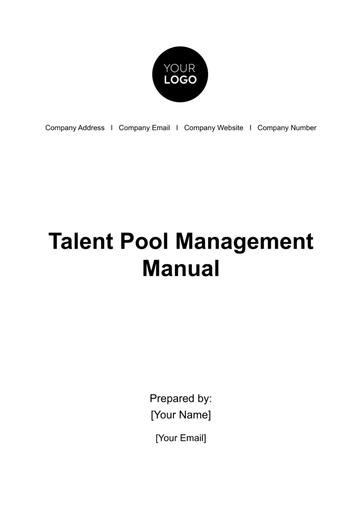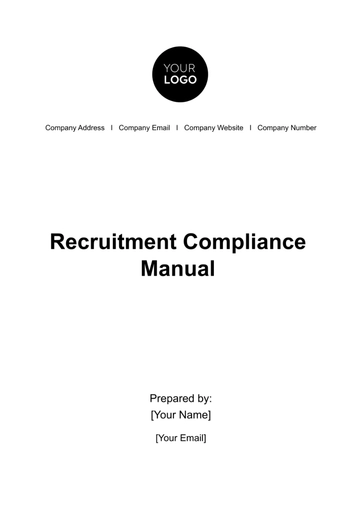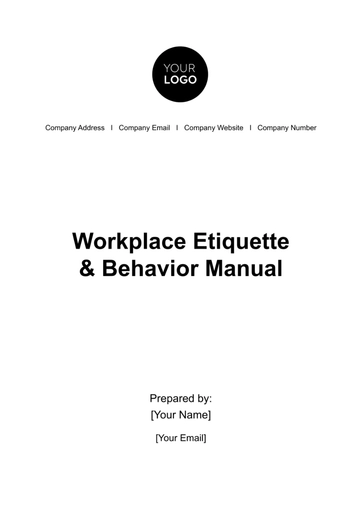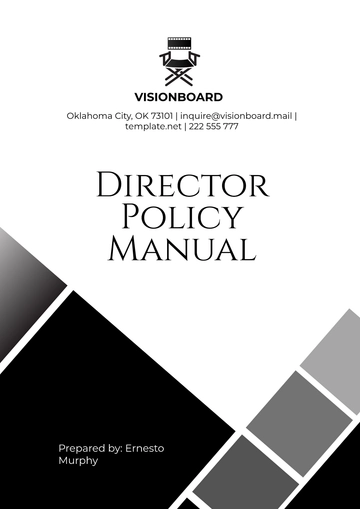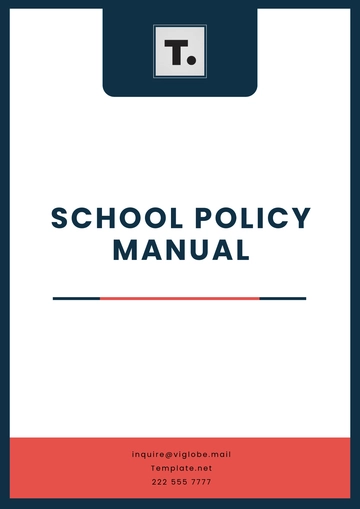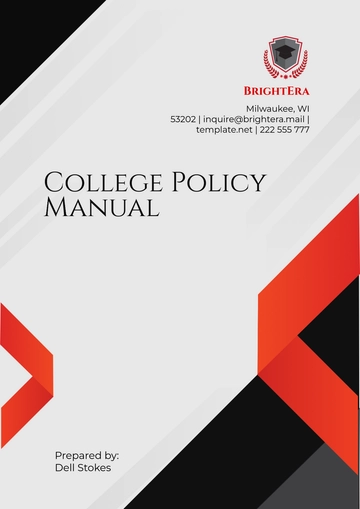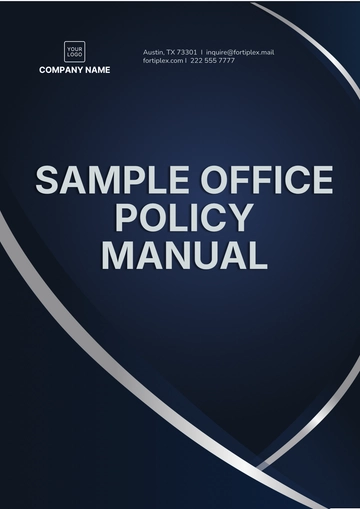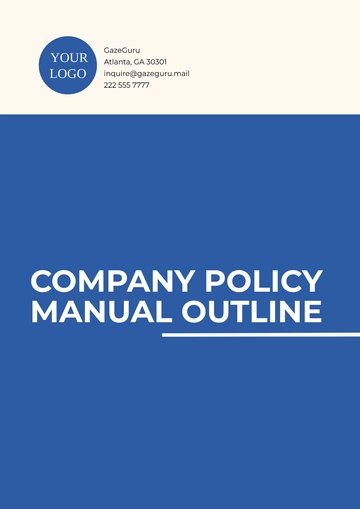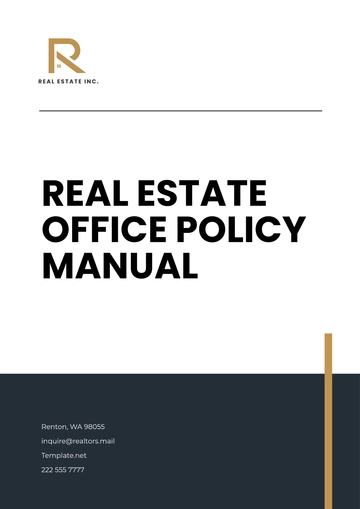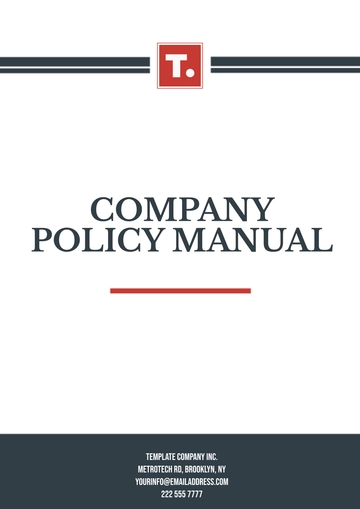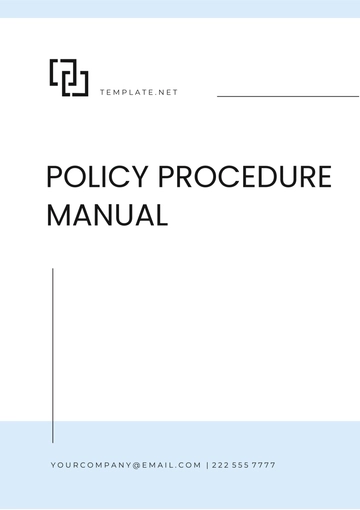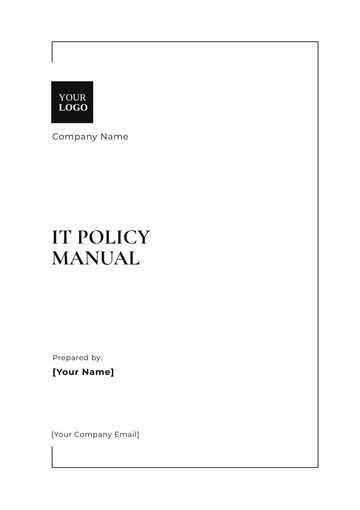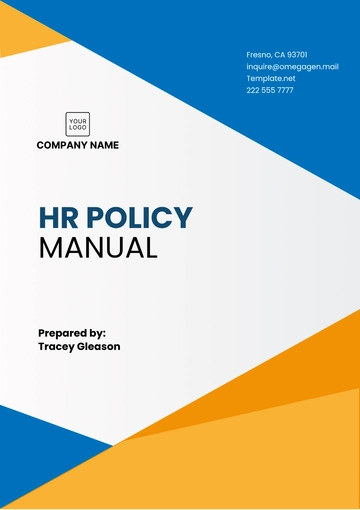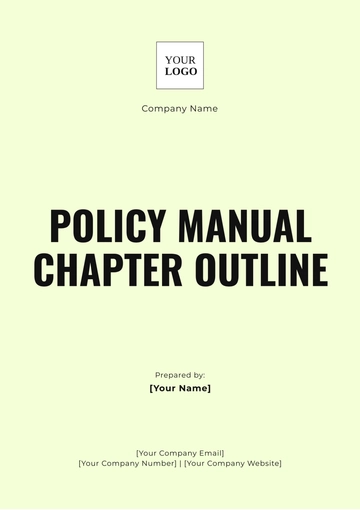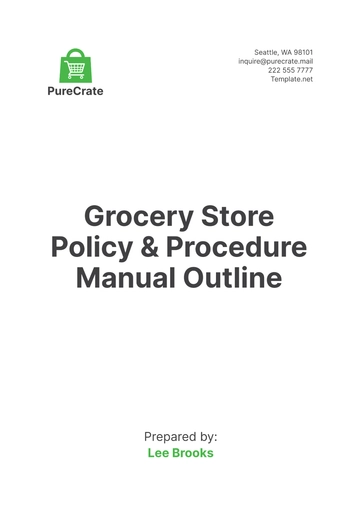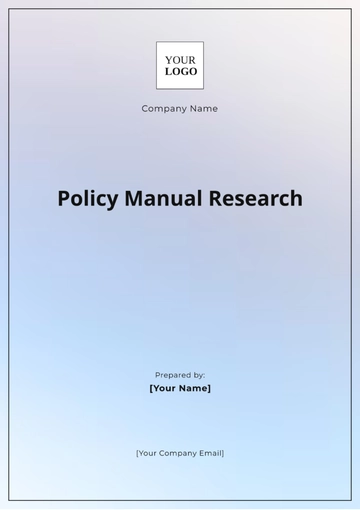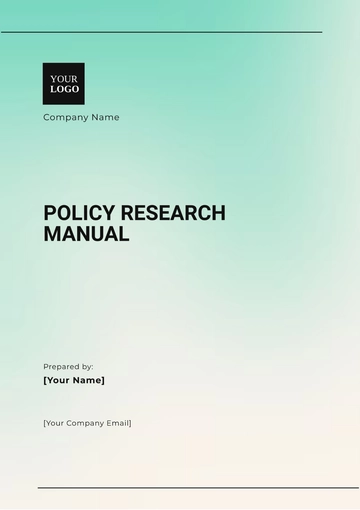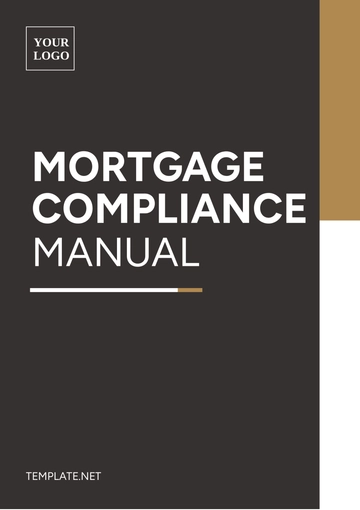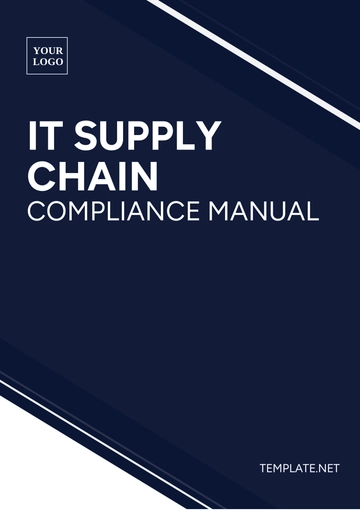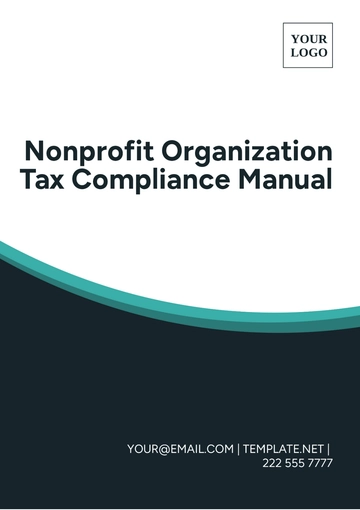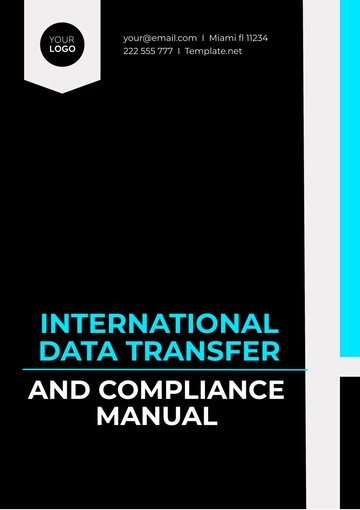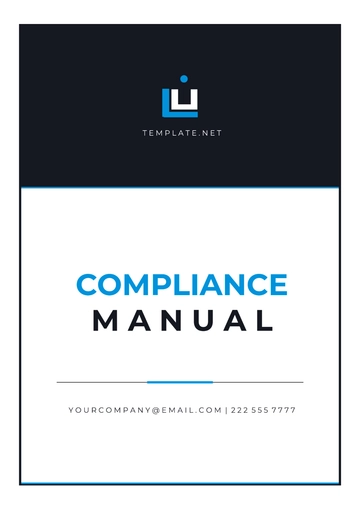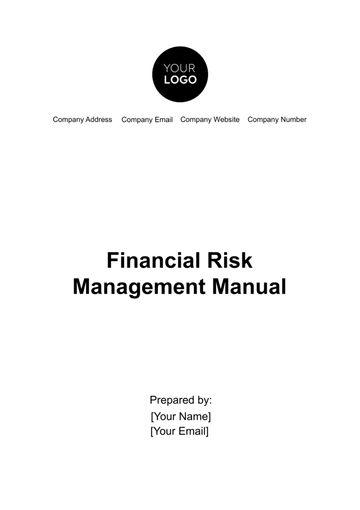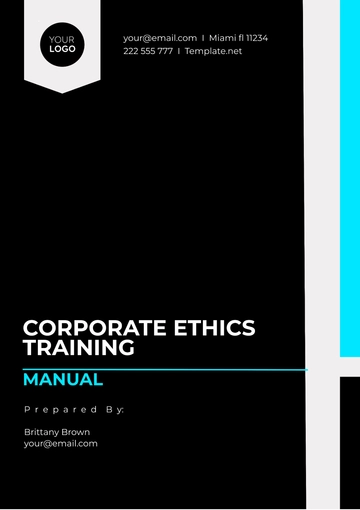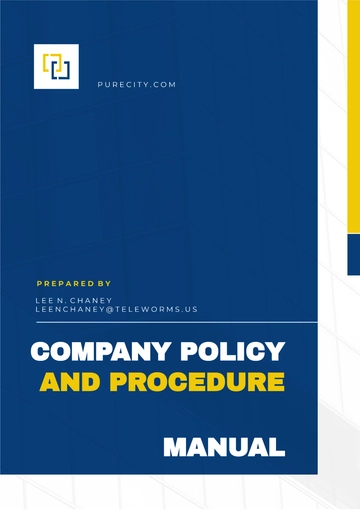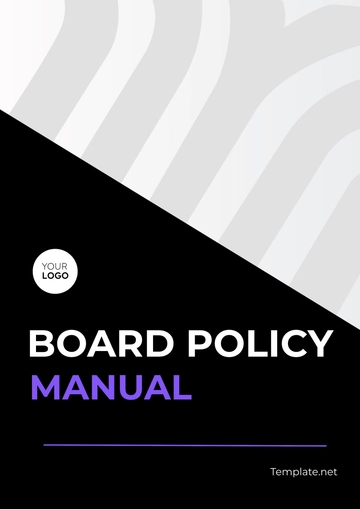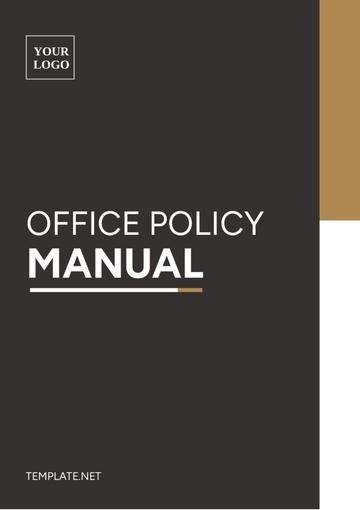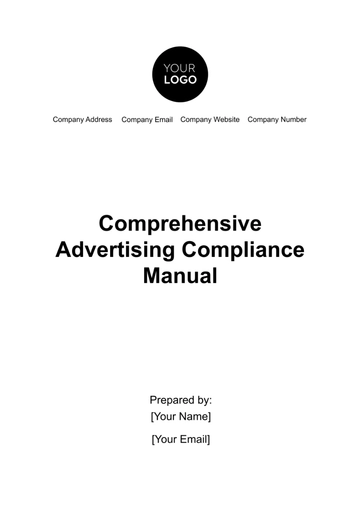Free Policy Manual Format
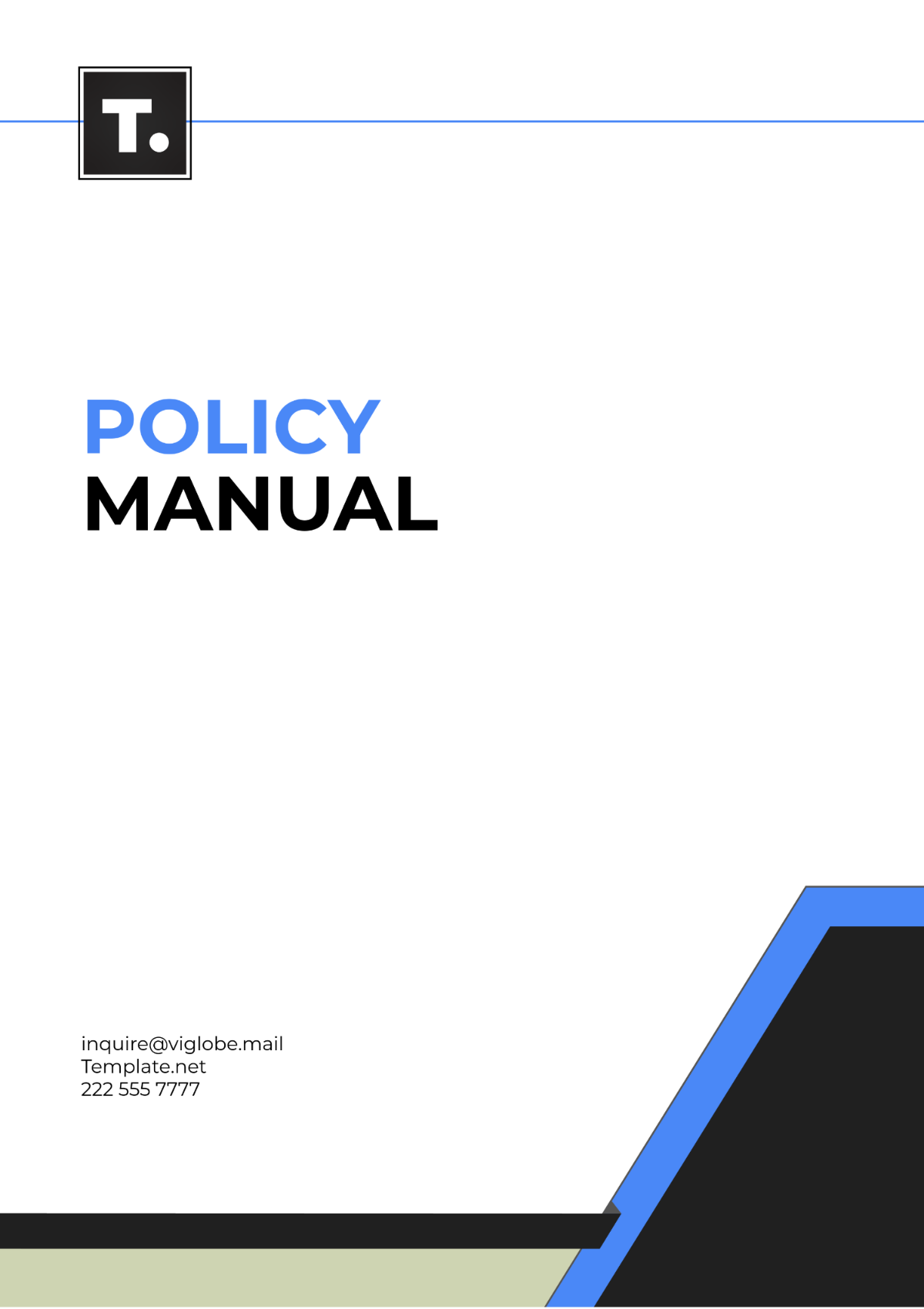
Name | [YOUR NAME] |
|---|---|
Company | [YOUR COMPANY NAME] |
Department | Human Resources |
Date | August 19, 2050 |
I. Introduction
The [YOUR COMPANY NAME] Policy Manual serves as a comprehensive guide for employees regarding the company's policies, procedures, and expectations. This manual outlines the principles and guidelines that govern the conduct of employees and the operations of the organization. By adhering to the policies outlined in this manual, employees contribute to a positive work environment and help uphold the values and standards of [YOUR COMPANY NAME].
II. General Policies
[YOUR COMPANY NAME] is committed to maintaining a workplace environment that is safe, respectful, and conducive to productivity. In accordance with this commitment, the following general policies are established:
Attendance: Employees are expected to report to work on time and adhere to their assigned work schedules. Any deviations from the schedule must be approved by the employee's supervisor or manager.
Dress Code: Employees are required to dress in a professional manner that is appropriate for their role and conducive to the workplace environment. Specific dress code guidelines may vary by department.
Communication: Open and transparent communication is encouraged at all levels of the organization. Employees are expected to communicate professionally and respectfully with colleagues, supervisors, and clients.
III. Employee Conduct
At [YOUR COMPANY NAME], we uphold high standards of conduct and professionalism. All employees are expected to conduct themselves in a manner that reflects positively on the company and aligns with our values. The following guidelines outline acceptable behavior:
Respect: Treat all colleagues, clients, and stakeholders with respect and dignity, regardless of differences in background, opinions, or beliefs.
Integrity: Act honestly and ethically in all business dealings and interactions. Avoid conflicts of interest and refrain from engaging in unethical or illegal activities.
Conflicts Resolution: Address conflicts or disagreements in a constructive and respectful manner. Seek assistance from supervisors or HR when necessary to resolve conflicts effectively.
Social Media: Exercise discretion and professionalism when using social media platforms. Refrain from posting content that could harm the company's reputation or violate confidentiality agreements.
IV. Workplace Safety
Ensuring the health and safety of our employees is a top priority at [YOUR COMPANY NAME]. We are committed to providing a safe and secure workplace environment for all employees. The following safety policies and procedures have been established:
Emergency Procedures: Familiarize yourself with emergency evacuation routes, assembly points, and procedures outlined in the emergency response plan. In the event of an emergency, follow instructions from designated emergency personnel.
Accident Reporting: Report any workplace accidents, injuries, or hazardous conditions to your supervisor or HR immediately. Prompt reporting is essential for addressing safety concerns and preventing future incidents.
Personal Protective Equipment (PPE): Wear appropriate PPE as required for your job duties. This may include safety goggles, gloves, helmets, or other protective gear to minimize the risk of injury.
Safety Training: Participate in safety training sessions provided by the company to increase awareness of workplace hazards and proper safety protocols.
V. Confidentiality and Data Protection
Protecting sensitive information is essential to maintaining trust with our clients and safeguarding the interests of [YOUR COMPANY NAME]. All employees are required to adhere to the following confidentiality and data protection policies:
Confidential Information: Treat all proprietary information, trade secrets, and client data as strictly confidential. Do not disclose confidential information to unauthorized individuals or third parties without proper authorization.
Data Security: Safeguard electronic and physical data from unauthorized access, theft, or loss. Follow established procedures for data encryption, password protection, and secure storage to prevent data breaches.
Non-Disclosure Agreements: Adhere to the terms of any non-disclosure agreements (NDAs) signed with clients or partners. Refrain from discussing confidential information outside of authorized business contexts.
Personal Data Protection: Handle personal data in accordance with applicable privacy laws and regulations. Obtain consent before collecting, processing, or sharing personal information, and ensure that data handling practices comply with privacy policies.
VI. Equal Opportunity and Non-Discrimination
[YOUR COMPANY NAME] is committed to providing equal employment opportunities to all individuals without regard to race, color, religion, gender, sexual orientation, national origin, age, disability, or any other characteristic protected by law. We adhere to a strict policy of non-discrimination and promote a diverse and inclusive workplace environment where all employees are treated with fairness and respect.
VII. Employee Benefits
At [YOUR COMPANY NAME], we value the well-being and satisfaction of our employees. To support your professional and personal development, we offer a range of benefits and perks. The following outlines our employee benefits policies:
Healthcare Coverage: Eligible employees may enroll in our comprehensive health insurance plan, which includes medical, dental, and vision coverage for employees and their dependents.
Retirement Savings: Take advantage of our retirement savings plan, which includes employer contributions and opportunities for employee contributions through payroll deductions.
Paid Time Off: Enjoy paid vacation, sick leave, and holidays to help you recharge and spend time with family and friends.
Professional Development: We encourage continuous learning and growth through training programs, tuition reimbursement, and opportunities for career advancement.
Flexible Work Arrangements: Explore flexible work options, such as telecommuting or flexible scheduling, to accommodate personal and professional responsibilities.
VIII. Leave and Time Off
Balancing work and personal life is important for overall well-being and productivity. Our leave and time-off policies are designed to provide employees with the flexibility they need to manage their time effectively. The following outlines our policies regarding leave and time off:
Vacation Leave: Eligible employees accrue vacation leave based on length of service and employment status. Requests for vacation leave should be submitted to your supervisor or manager in advance, whenever possible.
Sick Leave: Employees are entitled to sick leave for personal illness or injury, as well as for the care of sick family members. Notify your supervisor as soon as possible if you need to take sick leave.
Holidays: [YOUR COMPANY NAME] observes certain holidays each year, during which the office may be closed. Employees may be eligible for paid time off on designated holidays, in accordance with company policy and local regulations.
IX. Performance Management
Performance management is essential for fostering employee growth, development, and accountability. At [YOUR COMPANY NAME], we believe in providing regular feedback, coaching, and support to help employees succeed in their roles. The following outlines our performance management policies:
Performance Reviews: Employees undergo regular performance evaluations to assess their job performance, identify strengths and areas for improvement, and set goals for professional development.
Feedback: Managers provide ongoing feedback and guidance to employees to support their growth and success. Employees are encouraged to seek feedback from colleagues and supervisors to continuously improve their performance.
Goal Setting: Employees collaborate with their supervisors to establish clear and measurable goals aligned with the company's objectives. Goals are regularly reviewed and adjusted as needed to ensure alignment with business priorities.
Recognition and Rewards: [YOUR COMPANY NAME] recognizes and rewards employees for their contributions and achievements. This may include monetary bonuses, awards, or other forms of recognition to celebrate individual and team accomplishments.
X. Conflict Resolution
Conflicts are a natural part of any workplace environment, but it's important to address them promptly and effectively to maintain a positive and productive work environment. [YOUR COMPANY NAME] is committed to resolving conflicts in a fair and constructive manner. The following guidelines outline our approach to conflict resolution:
Open Communication: Encourage open and honest communication to address conflicts early and prevent escalation. Encourage employees to express their concerns and viewpoints respectfully and listen actively to understand different perspectives.
Mediation: When conflicts arise, facilitate mediation sessions to help parties involved in the conflict find mutually agreeable solutions. Mediation provides a neutral and confidential environment for resolving disputes and restoring positive working relationships.
Escalation Process: If conflicts cannot be resolved through informal means, escalate the issue to higher levels of management or HR for further intervention and resolution. [YOUR COMPANY NAME] is committed to providing a fair and impartial process for resolving conflicts and disputes.
XI. Code of Ethics
Maintaining the highest standards of ethical conduct is fundamental to the success and reputation of [YOUR COMPANY NAME]. Our Code of Ethics outlines the principles and values that guide our business practices and decision-making. All employees are expected to adhere to the following ethical standards:
Integrity: Act with honesty, fairness, and transparency in all business dealings. Avoid conflicts of interest and refrain from engaging in unethical or illegal activities.
Confidentiality: Safeguard confidential information and respect the privacy rights of clients, colleagues, and stakeholders. Refrain from disclosing proprietary information without proper authorization.
Professionalism: Conduct yourself in a professional manner and treat others with respect, dignity, and courtesy. Uphold the reputation and integrity of the company in all interactions.
Compliance: Adhere to all applicable laws, regulations, and company policies. Seek guidance from supervisors or HR if you are uncertain about the legality or ethical implications of a particular situation.
XII. Disciplinary Action
In cases where employees fail to meet performance expectations or violate company policies, disciplinary action may be necessary to address the issue and ensure compliance with established standards. [YOUR COMPANY NAME] follows a fair and consistent disciplinary process outlined as follows:
Investigation: Conduct a thorough investigation to gather relevant facts and evidence regarding the employee's conduct or performance issue. Ensure that the investigation is fair, impartial, and conducted in accordance with company policies and procedures.
Documentation: Document the findings of the investigation and any disciplinary actions taken, including verbal warnings, written warnings, or suspension. Maintain accurate records of all disciplinary actions for future reference.
Progressive Discipline: Apply progressive discipline as appropriate, starting with less severe measures and escalating to more severe consequences if the issue persists. Communicate clear expectations and consequences to the employee throughout the disciplinary process.
Appeals Process: Provide employees with an opportunity to appeal disciplinary decisions through an established appeals process. Ensure that appeals are handled objectively and impartially by an independent party or review panel.
XIII. Compliance
Compliance with laws, regulations, and industry standards is essential to the success and reputation of [YOUR COMPANY NAME]. We are committed to upholding the highest standards of legal and regulatory compliance in all aspects of our business. The following policies and procedures outline our commitment to compliance:
Legal Compliance: Ensure that all business activities and operations comply with applicable local, state, and federal laws and regulations. Stay informed about changes in laws and regulations that may impact our business and take proactive measures to maintain compliance.
Regulatory Reporting: Timely and accurately report information to regulatory authorities as required by law. Maintain records and documentation to support regulatory compliance efforts and facilitate audits or inspections.
Ethical Standards: Conduct business with integrity and in accordance with ethical principles and industry best practices. Avoid engaging in deceptive, fraudulent, or unethical conduct that could harm the company or its stakeholders.
Training and Awareness: Provide employees with training and resources to increase awareness of compliance requirements and expectations. Ensure that employees understand their responsibilities for maintaining compliance and have access to support and guidance when needed.
XIV. Appendices
The appendices section of the Policy Manual includes supplementary materials and resources that support the policies and procedures outlined in the manual. Appendices may include:
Forms and Templates: Standardized forms and templates for various HR processes, such as performance evaluations, leave requests, and incident reports.
Glossary: Definitions of key terms and terminology used throughout the Policy Manual to ensure clarity and consistency in interpretation.
References: Citations and references to relevant laws, regulations, industry standards, and company policies referenced in the manual.
Acknowledgments: Acknowledgments and disclaimers regarding the creation and distribution of the Policy Manual, including copyright information and confidentiality statements.
XV. Conclusion
In conclusion, the [YOUR COMPANY NAME] Policy Manual serves as a crucial guide for employees, outlining our principles, expectations, and procedures. By adhering to these standards, employees contribute to a positive work environment and uphold the integrity of the company. Regular review and adherence to this manual are essential for maintaining a culture of professionalism and compliance. For any questions or clarifications, please consult your supervisor or HR representative.
- 100% Customizable, free editor
- Access 1 Million+ Templates, photo’s & graphics
- Download or share as a template
- Click and replace photos, graphics, text, backgrounds
- Resize, crop, AI write & more
- Access advanced editor
Discover the ultimate solution for crafting comprehensive policy manuals with ease, exclusively at Template.net. Our editable and customizable Policy Manual Template streamlines the process, ensuring seamless adaptation to your organization's needs. Edit effortlessly using our Ai Editor Tool, guaranteeing precision and professionalism every step of the way.
